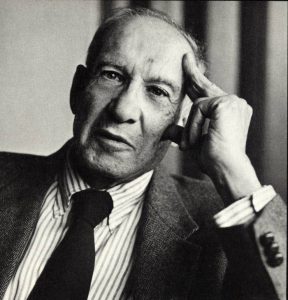
One of the most enjoyable parts of my job is spending time with people looking to follow their dream and start new businesses. And time after time, I refer to what I learned in one single book: Innovation and Entrepreneurship by Peter Drucker.
 Peter Drucker may be the most revered business leader and author in history. He has written some of the most inspirational and influential books in the field and while Innovation and Entrepreneurship is not his best-known book, it is a resource I have re-read many times in my career.
Peter Drucker may be the most revered business leader and author in history. He has written some of the most inspirational and influential books in the field and while Innovation and Entrepreneurship is not his best-known book, it is a resource I have re-read many times in my career.
The book is also special to me because I took classes from Dr. Drucker when I was in graduate school in Los Angeles. At the peak of his intellectual powers even in his 80s, he would sit on the front edge of his desk every Saturday morning and lecture for three hours on his books, including this one. Over three years, I learned a lifetime of lessons from him that I use each day.
If you are passionate about innovation and entrepreneurship, here are three major lessons you can take away from this seminal book:
The mechanics of entrepreneurship
Although this book was written in 1985, Dr. Drucker correctly predicted the rise of an entrepreneurial economy based on technological shifts and rapid innovation. While the world was still transitioning to a service economy, Drucker was already thinking ahead to an economy fueled by entrepreneurs.
An interesting insight is that technology doesn’t just change a marketplace — it also changes attitudes, behaviors, and organizations. An idea provokes much greater ripples than just a new product.
He said that companies that are not in a constant state of renewal — and prepared to continuously jettison out-moded products — are vulnerable.
Drucker adds that starting a business isn’t entrepreneurship if you are simply a “me too” copying something that already exists. He proposes many now-famous ideas for discovering and occupying a niche.
Innovation and entrepreneurship is purposeful
Drucker explains that innovation isn’t a function of a wild-haired scientist yelling “eureka!” in his basement. Innovation is iterative, and that some of the world’s greatest products were simply better versions of something that existed before. He points out that the first versions usually fail and that the companies that iterate on those failures are most likely to succeed. Innovation is WORK!
He defines the seven source of entrepreneurial opportunity:
- The unexpected — An insight that occurs by an accidental discovery.
- Incongruity — When there is a gap between what you expect and what really is. Data can be a source of inspiration in this category.
- Filling a process need — Finding the “weak link” and finding a better way.
- Changes in industry structure — Epic changes like the Internet, globalization, and the collaborative economy are opportunities for innovation.
- Demographics — For example, shifts in age, education, and location are seeds for change.
- Changes in perception and mood — Lifestyles and attitudes toward products change over time. Today, wearing sneakers to a business meeting happens all the time. This never would have occurred in 1980. The sales of athletic wear grew simply because of a change in attitude.
- Scientific breakthroughs — Like air travel, new materials, faster computers.
A framework for innovation and entrepreneurship
Perhaps Dr. Drucker’s greatest contribution through this iconic book is his idea on establishing a process for continuous innovation in every company. His approach makes so much sense that it has always amazed me why this formula hasn’t been adopted by every company in the world.
Even large companies can innovate if they weave it into their culture. There needs to be a PLAN to innovate, not just an expectation. Large companies may even have an advantage when it comes to innovation because done well, they have the resources and expert experiences to bring an idea to life.
Drucker says that one of the most important functions in a company is to continuously and systematically look for change that can be leveraged in the firm. He also preaches simplicity in all of his books — keep your approach uncomplicated. Don’t be afraid to start small and iterate.
Don’t splinter into so many ideas that you can’t keep up. Focus. Ideas that take a business completely out of its core business rarely succeed.
He once famously said a company is marketing and innovation — everything else is overhead. Without customers, and without a continuous stream of ideas to keep a company ahead in the race, you will fail. Through this little book. Peter Drucker left a lasting gift to the world to do just that.
 Mark Schaefer is the chief blogger for this site, executive director of Schaefer Marketing Solutions, and the author of several best-selling digital marketing books. He is an acclaimed keynote speaker, college educator, and business consultant. The Marketing Companion podcast is among the top business podcasts in the world. Contact Mark to have him speak to your company event or conference soon.
Mark Schaefer is the chief blogger for this site, executive director of Schaefer Marketing Solutions, and the author of several best-selling digital marketing books. He is an acclaimed keynote speaker, college educator, and business consultant. The Marketing Companion podcast is among the top business podcasts in the world. Contact Mark to have him speak to your company event or conference soon.
Top illustration courtesy Flickr CC and Camera Eye Photography.
Illustration of Peter Drucker courtesy Claremont Graduate University.
Book link is an affiliate link.


